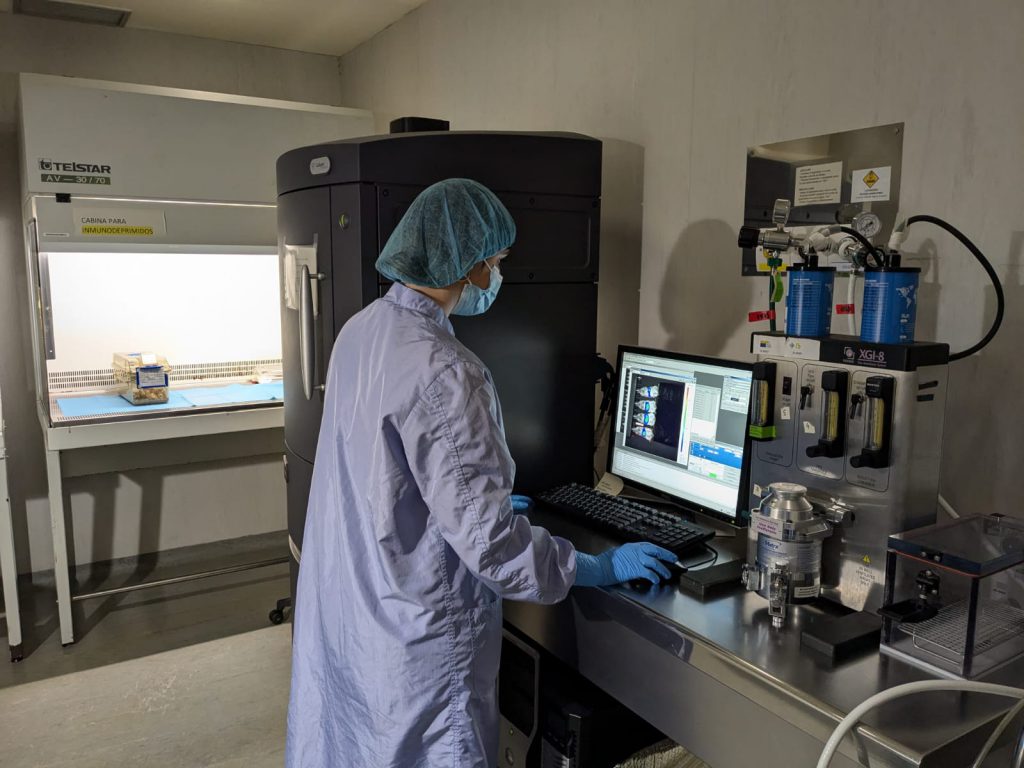In vivo antitumor activity
The aim of this service is to evaluate the biodistribution and/or the in vivo antitumor activity of nanoparticles and drug-loaded nanoparticles. Thus, we offer different tumor mouse models, subcutaneous and orthotopic, in which we can determine the biodistribution of nanoparticles, with or without loaded drug, in normal and tumor tissues. Moreover, we can also determine the antitumor activity of the compounds in different tumor models. In the service we have subcutaneous and orthotopic/disseminated models of lymphoma, leukemia and colorectal, endometrium, head and neck carcinomas. Moreover, we have also available PDX models of colorectal and endometrium cancer. We can also offer the possibility to set up new animal models of other tumor types.
Customer benefits
The customer will benefit from the experience of the researchers involved in the service that have performed the in vivo evaluation of a high number of diverse nanoparticles. The service has also high expertise in developing new cancer animal models. Thus, we offer also the possibility of setting up new models of any cancer type that fit with the needs of the costumer. Moreover, the conditions of the assays are flexible and will be adapted to the need of each specific compound.
Target customer
The offered service can be of interest to research groups of academia or companies willing to test the antitumor activity of nanoparticles or drug-loaded nanoparticles in vivo.

References
- Martínez-Torró C, Alba-Castellón L, Carrasco-Díaz LM, Serna N, Imedio L, Gallardo A, Casanova I, Unzueta U, Vázquez E, Mangues R, Villaverde A. Lymphocyte infiltration and antitumoral effect promoted by cytotoxic inflammatory proteins formulated as self-assembling, protein-only nanoparticles. Biomed Pharmacother. 2023 Aug;164:114976. doi: 10.1016/j.biopha.2023.114976.
- Rioja-Blanco E, Arroyo-Solera I, Álamo P, Casanova I, Gallardo A, Unzueta U, Serna N, Sánchez-García L, Quer M, Villaverde A, Vázquez E, Mangues R, Alba-Castellón L, León X. Self-assembling protein nanocarrier for selective delivery of cytotoxic polypeptides to CXCR4+ head and neck squamous cell carcinoma tumors. Acta Pharm Sin B. 2022 May;12(5):2578-2591. doi: 10.1016/j.apsb.2021.09.030.
- Falgàs A, Garcia-León A, Núñez Y, Serna N, Sánchez-Garcia L, Unzueta U, Voltà-Durán E, Aragó M, Álamo P, Alba-Castellón L, Sierra J, Gallardo A, Villaverde A, Vázquez E, Mangues R, Casanova I. A diphtheria toxin-based nanoparticle achieves specific cytotoxic effect on CXCR4+ lymphoma cells without toxicity in immunocompromised and immunocompetent mice. Biomed Pharmacother. 2022 Jun;150:112940. doi: 10.1016/j.biopha.2022.112940.
- -Medina-Gutiérrez E, García-León A, Gallardo A, Álamo P, Alba-Castellón L, Unzueta U, Villaverde A, Vázquez E, Casanova I, Mangues R. Potent Anticancer Activity of CXCR4-Targeted Nanostructured Toxins in Aggressive Endometrial Cancer Models. Cancers (Basel). 2022 Dec 23;15(1):85. doi: 10.3390/cancers15010085.
- Sala R, Rioja-Blanco E, Serna N, Sánchez-García L, Álamo P, Alba-Castellón L, Casanova I, López-Pousa A, Unzueta U, Céspedes MV, Vázquez E, Villaverde A, Mangues R. GSDMD-dependent pyroptotic induction by a multivalent CXCR4-targeted nanotoxin blocks colorectal cancer metastases. Drug Deliv. 2022 Dec;29(1):1384-1397. doi: 10.1080/10717544.2022.2069302.
- Serna N, Falgàs A, García-León A, Unzueta U, Núñez Y, Sánchez-Chardi A, Martínez-Torró C, Mangues R, Vazquez E, Casanova I, Villaverde A. Time-Prolonged Release of Tumor-Targeted Protein-MMAE Nanoconjugates from Implantable Hybrid Materials. Pharmaceutics. 2022 Jan 14;14(1):192. doi: 10.3390/pharmaceutics14010192.
- Pallarès V, Unzueta U, Falgàs A, Aviñó A, Núñez Y, García-León A, Sánchez-García L, Serna N, Gallardo A, Alba-Castellón L, Álamo P, Sierra J, Cedó L, Eritja R, Villaverde A, Vázquez E, Casanova I, Mangues R. A multivalent Ara-C-prodrug nanoconjugate achieves selective ablation of leukemic cells in an acute myeloid leukemia mouse model. Biomaterials. 2022 Jan;280:121258. doi: 10.1016/j.biomaterials.2021.121258.








